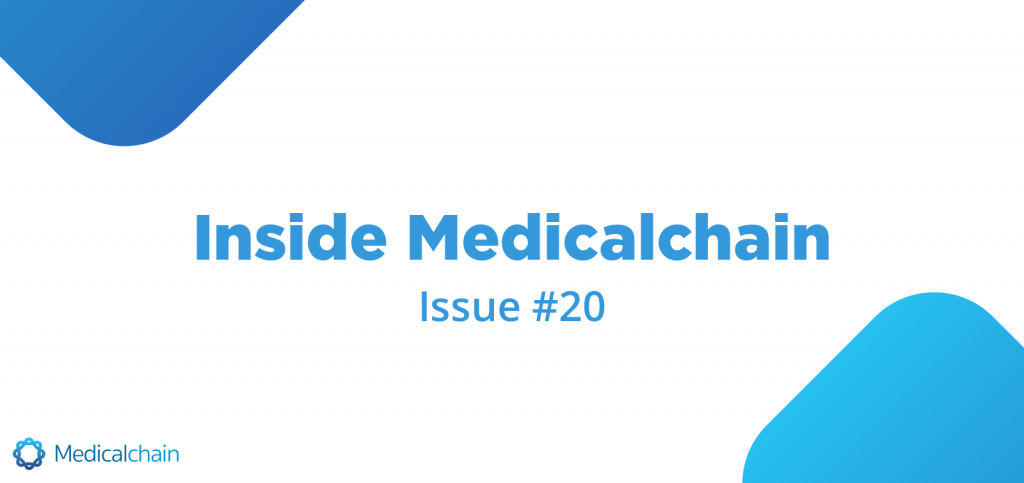
Welcome to the twentieth issue of Inside Medicalchain, our monthly newsletter to keep our community up to date. If you missed the nineteenth issue, you can catch up by clicking here.
Announcing a new NHS pilot partnership
We are pleased to announce that we have made a new agreement with the Medway Innovation Hub to pilot our technology in their Clinical Commissioning Group. This is a team focussed on providing leading tech to help support their 55 GP family practices from across the Medway towns serving a patient population of 295,223.
From Medway Innovation Hub themselves:
“Medway Innovation Hub is proud to have been awarded pilot site status from the Royal College of General Practitioners Innovation Mentorship Programme. We are excited to announce Medicalchain as our first partnership.
Decentralising medical records and putting the patient in the centre of their health journey, utilising secure blockchain technology, is an exciting vision to work together on. We at MiH are really keen to explore how this platform can improve patient experience, care and transparency of information across traditional organisational boundaries.”

MyClinic.com Rooms is going strong!
As many of you are aware, we released MyClinic.com Rooms in early April in response to the current coronavirus pandemic. Rooms is a simple tool designed by us to allow for a virtual waiting room where patients can be directed to ‘check into’ whilst they wait for their doctor to begin the video consultation.
We are proud to share with you some updated numbers about our usage. We have been used in over 78 countries worldwide!
Check out a heatmap of all the countries below!
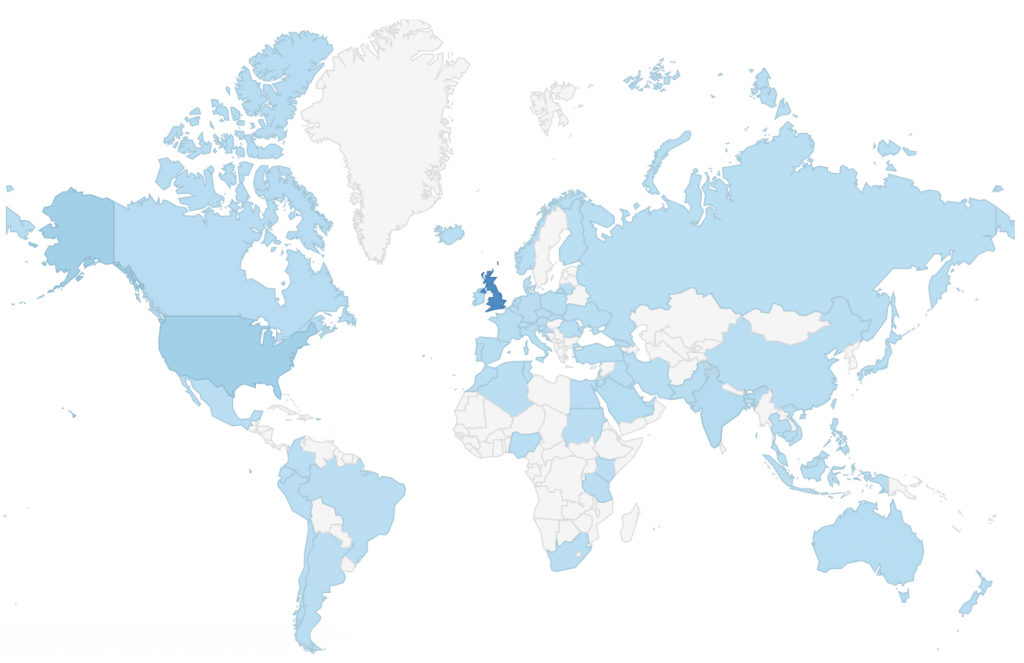
MyClinic.com Rooms has been in use in over 78 countries since its release in early April.
Product development
We continue to work hard to pack our solutions full of features. We are responding directly to feedback from our users, and the next ones coming up include:
- Live doctor, which will allow patients and clinician messaging in-video. Following the consultation, the written transcript will be emailed to both users to help signpost patients to helpful websites.
- SMS (text messaging)/Email invitation from the clinic. This is being added so to ease the join-in process for the patient.
- Screen sharing from the clinician’s view.
If you have any questions, do check out our Help Centre and don’t hesitate to get in touch at [email protected] if you have any suggestions.
Media
Our Research Fellow, Dr Danyal Akarca published a piece in the world-renowned HIMSS: Empowering patients with access to health records through distributed applications.
In his piece, Dr Akarca outlines the current shortcomings of health data infrastructures which we are trying to address, how we can empower patients through blockchain and how telemedicine can act as a gateway in this process.
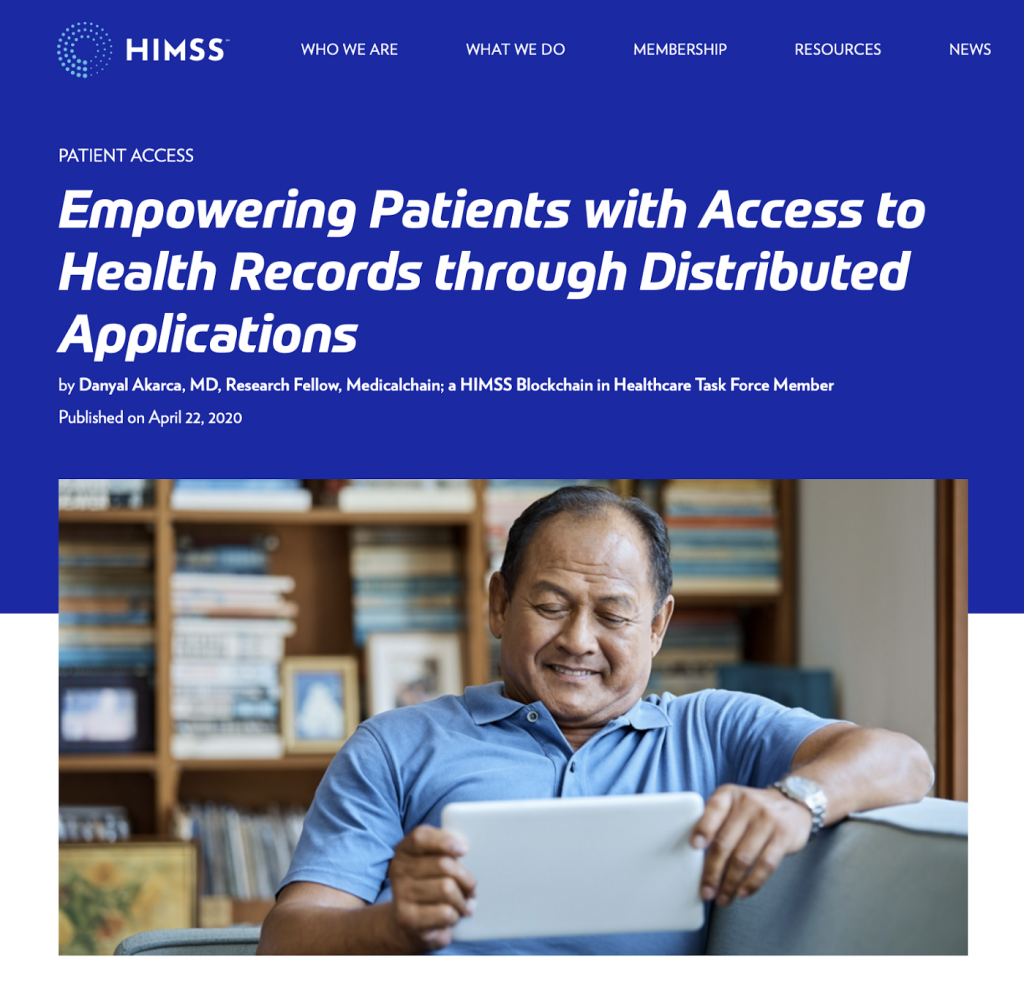
Our CEO, Dr Abdullah Albeyatti recently gave an exclusive interview with the Cryptonomist, which you can find here.
In the interview, Dr Albeyatti delves into how blockchain can be used in light of the current pandemic. Furthermore, he outlines how we should be continuing to support cryptocurrencies such as bitcoin during these times.
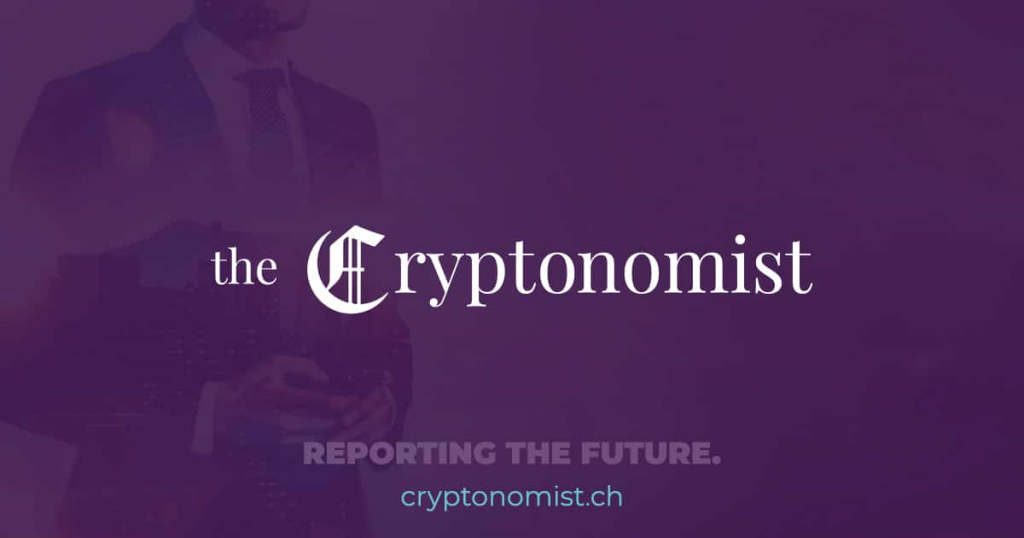
Inside perspective
This section aims to provide an insight into the project, including the people behind the scenes who are working extremely hard to make our vision a reality.
We are proud to introduce our newest member to the team: Graham Downhill. Graham is our new Product Director, charged with overseeing all product and feature developments of MyClinic.com. As part of this role, he will engage with users, incorporate feedback into the product design and definition, strategically plan upcoming developments and undertake the new market analysis.
Graham has plenty of experience in the healthcare software industry. We interviewed Graham so that you can understand a little more about him and his future work with us. Enjoy!
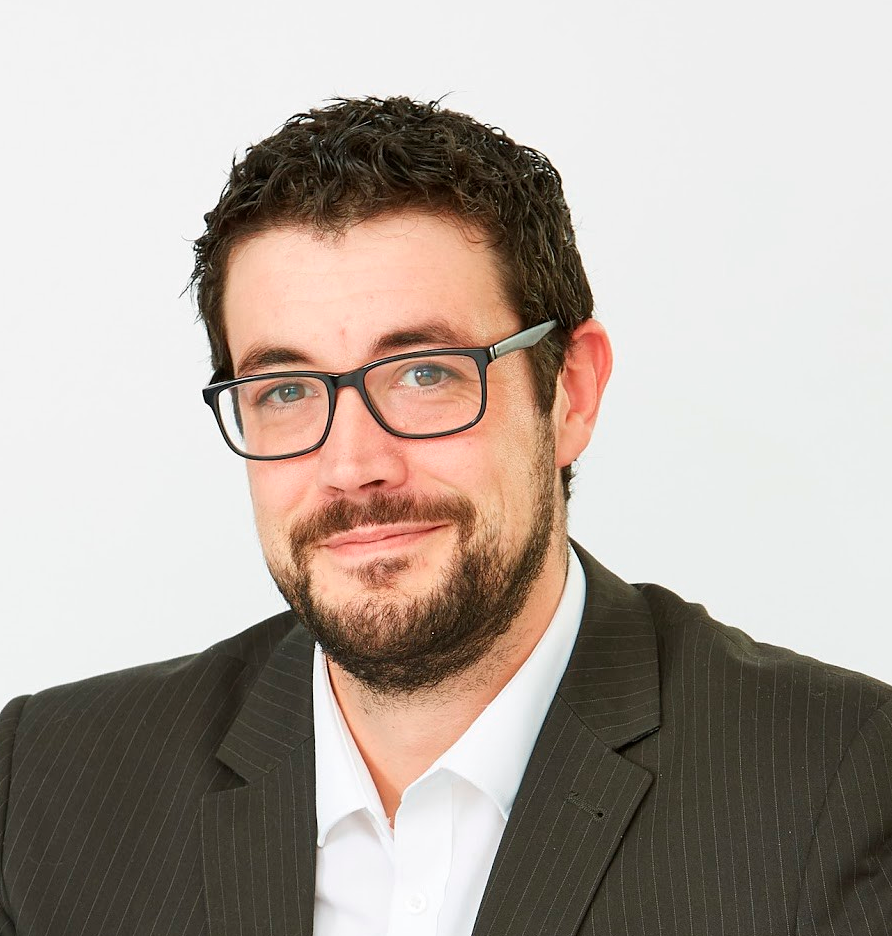
Welcome to the team Graham! Could you give us a little bit more information about your background?
Sure, and thank you! For the last decade or so, I’ve been working in Healthcare software, for a fairly well known clinical system provider to Primary Care, Secondary, Pharmacy, and Community settings in the UK.
I’ve always been an advocate for better utilisation of healthcare data to address the biggest issues in the NHS today, and for the past few years, I’ve been heading up Product development for Research and Academia, Life Sciences, and Data services. Also, my Clinical Insights division owned and managed the various Partner Interfaces available for the health tech community looking to integrate into Primary Care. Some career highlights so far have been working on large scale research programmes with partners like Public Health England, QResearch, CPRD, UK Biobank, IQVIA, as well as partners within the NHS itself, NIHR, HDRUK, and wider Life Sciences community. Alongside that, it’s been a real privilege to work with some of the large and small tech innovators in the UK to deliver and implement new features to clinicians which not only help save time but also help save lives.
All in all, I’ve had a pretty varied role within healthcare software over the years, which is par for the course if you’re in Product Management! It’s very much a “jack-of-all-trades” role: Good Product Managers sit neatly between Technology, Commercial, Marketing, and the User, and help draw the various areas together via a shared vision for the end result. On any given day, I could be running standups and sprint ceremonies, briefing my Product team on this weeks business objectives, prioritising bug fixes, meeting partners and offering technical advice on interface specifications, assessing Risk Stratification algorithms, analysing software utilisation statistics, briefing marketing on a go-to-market strategy, and then planning a UK wide implementation of a research project.
What was it about Medicalchain that made you want to join?
In short, its potential.
What the team here at Medicalchain are doing absolutely has the potential to revolutionise healthcare for the better. Our new Open-source approach is truly ground-breaking for healthcare organisations who have, perhaps in the past, been put off by ill-fitting EPR systems, expensive licenses, or the implementation overheads.
Moreover, I think the team is agile enough to respond quickly to market requirements — just take a look at MyClinic Rooms! It was staggering how quickly Medicalchain launched a new product to market; it went from idea to production in just two weeks. This is the type of pace which is required in health tech right now. Most incumbent suppliers have a feature backlog as long as your arm, with contractual commitments, and technical debt on ageing technology stacks which mean that they will struggle to deliver true value using their existing products or add-ons fast enough in a rapidly changing healthcare landscape.
I came to Medicalchain to bring learnings from the big EPR providers to a lean and agile company who can out-innovate the incumbent suppliers and, dare I say it, disrupt the industry a bit!
Ultimately though, I have to say, what attracted me to Medicalchain was not necessarily the shiny tech or the Blockchain element, it’s that as a company they really put patients and clinicians at the heart of everything they develop.
How do you see the landscape of interoperability in health records emerging?
That’s a complex one, particularly given the current COVID-19 situation. I think it has brought into the public consciousness that healthcare runs on data, be that a patient’s record being available at the right place and at the right time, or aggregate level statistics being used to properly plan for and monitor events. With the recent relaxation of some of the IG stipulations regarding interoperability, data access, and remote working (for example personal device usage for clinicians), I can foresee some difficulty reverting to what were arguably, outdated mechanisms of record sharing, access and interoperability. This current crisis, to my mind, is a catalyst for change.
What will be more important than ever in a post-COVID world with regards to interoperability, will be consent. Consent from both the Data Subject (the patient) and the Data Controller (currently the GP Practice, or NHS Trust). This consent needs to be auditable, immutable, and correct in all circumstances, and the patient needs to be in control, informed, and aware of their consent preferences and which organisations and businesses who hold records pertaining to them.
Transparency is also important regarding Patient data sharing, in my opinion. I want to know how my data is being shared, and I want a quick and easy way of challenging that sharing if I feel it is inappropriate. Conversely, I want to be able to see where I could share my record for the benefit of the research community (be that pseudonymised, anonymised, or in the clear).
Obviously, consent is relevant for record sharing and research, but it’s also important for the wider health-tech community in the UK. It’s hard to build technologies and software for the health sector which add value without access to a patient’s record. There are many, many convoluted processes which create a barrier for new entrants into the health-tech market in the UK. Some of them are valuable and necessary (being on an accredited framework for example so only quality tech companies “make the cut”), but after that, the rules become much more difficult to navigate; IG, GDPR and record access for example. Simplifying this with an immutable patient-owned consent and sharing process would only improve the ability to innovate, reduce speed to market for these innovations, and ultimately improve the quality of care the clinicians in the UK are able to provide by using these innovations.
From experience, there have been a number of NHS initiatives to try and solve the above consent problem. While welcome, it’s scope is currently limited, and historically, these tech advancements have moved at a somewhat glacial pace. Perhaps it’s time for an innovative tech company to create a little disruption and accelerate this?
Where do you see blockchain and digital health converging?
I have to admit, to me, blockchain is just an enabling technology, in much the same way as SQL or Javascript. From a product perspective, I’m interested and enthused by the end-user value it can bring, rather than how it brings value in its own right. That’s not to say I don’t geek out a little when we discuss blockchain and smart contracts, rather, I try and focus on the patient and clinician experience. To my mind, immutable and auditable person-centric records in health should already exist, and it’s a sad truth that they don’t. I know for a fact my clinical record is fragmented, duplicated, and branched in various different settings. There are multiple patient records for me as a person.
While it’s a tired old trope, I do envision a future where my health record is like my bank account or credit history. I can see clearly who has access to my record, what my record looks like in full, with each “transaction” being a clinic visit where important information is recorded. I want to be able to share this information with whom I choose, electronically, be they insurers, researchers, local authority, private clinics, or my own Clinical Commissioning Group.
I’d like to be able to add new information to this record too. My genetic data I just had done online, my medication compliance, blood pressure, SpO2 using my Samsung phone, how I’m doing against my care plan goals, and other things which might be called “patient recorded outcomes” in NHS speak. I want more empowerment over my own health record.
The real reason is a selfish one, by the way, I really want to save myself time by avoiding another visit to the GP for a Medication review, health check, or long-term condition review. I really want to be able to manage my own health remotely, and in preparation for my upcoming clinic visit at the hospital, I want to choose to share my record with the clinician I am seeing, having reviewed it myself, so we’re both on the same page.
If that happens, just imagine how much administrative burden would be reduced in healthcare. Hopefully then, the limited funding available could be used to improve patient outcomes leading to longer, healthier lives for everyone.
Social Media
Thank you to everyone who has taken the time to ask us questions and engage with our communications team. If you have not had the chance to say hello yet, please click on one of the links!
Join a Medicalchain Community Today!
· Telegram (English)
· Telegram (Japanese — Medicalchain 日本公式コミュニティ)
· Telegram (Chinese — Medicalchain 官方中文群)
· Telegram (Italian — Medicalchain Italia)
· Telegram (Korean — Medicalchain 공식채팅방)
· Twitter (Japanese)
· Medium
· Youtube
Don’t forget to sign up for your free healthcare passport
The Medicalchain Health Passport signup is live! Prospective patients and medical practitioners can register their interest now, by clicking here.
Upcoming Issues
- About our formal launch of MyClinic.com with onboarding of new clinics.
- Partnerships within the NHS and private sector that we are very much looking forward to sharing with you all.
Thanks for reading the twentieth newsletter of Inside Medicalchain. For more information on where to purchase our tokens (MTN), click here. Follow the development of Medicalchain on Facebook, Twitter, Instagram, and join the community on Telegram.

